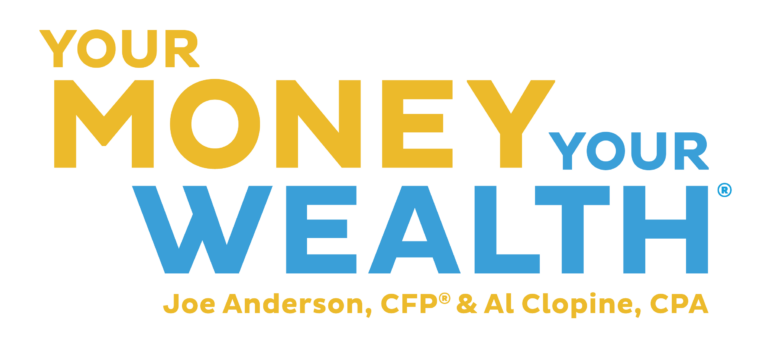Editor of Kiplinger’s Retirement Report, Rachel Sheedy joins Joe Anderson, CFP® and Alan Clopine, CPA to discuss inherited IRA (individual retirement account) rules & strategies for beneficiaries. Plus, how to become an extreme saver in 2017. Original publish date January 7, 2017 (hour 1). Note that content may be outdated as rules and regulations have changed.
Important Points:
04:43 “Let me recap on 2016 – I have a year-end report here. We had a rocky start in the beginning of the year…the first month was the first January in the history of the stock market…”
07:46 “Almost half of the gains happened in just a few weeks – that’s why timing markets is so incredibly difficult. No one guessed this.”
08:37 “Be fully diversified and make sure that you have the right risks at the right times given your specific goals…to wrap up 2016, it was a wild ride – there were a heck of a lot of different things that happened but at the end of the year if you stayed true to your investment strategy, you probably ended up with a decent year.”
11:24 Start of Interview with Rachel Sheedy
Joe: (11:57) “What are some things that you’re writing about that people should be aware of?”
Rachel: (12:00) “There are definitely some key points that heirs really need to be aware of that can really maximize an inherited IRA…a big key is [looking at if there] are there different rules for spousal beneficiaries of an IRA versus non-spouse beneficiaries. Spousal beneficiaries have a lot of leeway – they can essentially take the account as their own. Non-spouse beneficiaries can’t do that. They’ve got more rules that they need to pay attention to.”
12:30 “One of the key things they need to know is that they need to re-title the account…they need to re-title it as an inherited IRA and make sure that their name and the decedent’s name are listed when they re-title it to make sure they know who is who – that’s step number one.”
Joe: (13:06) “That’s right, it has to stay in the decedent’s name or it could really blow up on them.”
Rachel: (13:10) “That’s definitely a move people should not make, they should not roll that inherited account over into their own if they’re a non-spouse beneficiary. They need to re-title it as an IRA.”
Joe: (13:20) “When it comes to spouses, what would you talk about in regards to keeping it in the decedent’s name or rolling the decedent spouse into their own?”
Rachel: (13:32) “One of the big things is whether the surviving spouse is younger than 59 ½. If they’re younger than 59 ½ and they need that money, if they keep that account as a beneficiary they can cap it without having to pay the early withdrawal penalty, and that’s true for any beneficiary that’s capping a traditional IRA.”
Al: (16:47) “The rules are so complicated when it comes to IRAs…if you’re not the spouse then you have to start taking required minimum distributions and a lot of people don’t realize it even if you’re 20 years old you’ve got to start taking a required minimum distribution.”
Rachel: (17:13) “Right, that’s a key point. If you want to be able to keep that IRA alive and be able to stretch it out for potentially decades, you need to start taking required distributions. You can also take out more if you wanted to, but if you take out that minimum amount you can keep that IRA going.”
Al: (17:31) “That’s also true for Roth IRAs, because the account owner doesn’t have to take a required distribution but a non-spouse beneficiary does, although it’s tax-free.”
Rachel: (17:46) “Roth IRA heirs need to realize that they’ve got to take distributions even though the owner didn’t, but the distributions will be tax-free – they are taxable income if it’s a traditional IRA.”
Joe: (18:00) “Rachel, this is great information. Where can our listeners get more information about you and read up on what you’re currently doing?”
Rachel: (18:06) “Kiplinger.com is a great resource if you go to the retirement section our cover shows up there. You can search by different topics – IRAs, Social Security, etc.”
18:19 End of Interview with Rachel Sheedy
20:02 “These are mistakes that we see those people 55 years and older making, and mistake number one is underestimating longevity.”
24:05 “If you find it impossible to save, start at least small – just get the ball rolling.”
33:31 “Another thing that people don’t think about is the taxation of saving accounts because there are different places to save. You can save in your 401(k) or 403(b) if you have one, you can save in your trust account, savings account, you can save into a Roth IRA or a Roth provision in your 401(k) or 403(b).”
Listen to the YMYW podcast:

Amazon Music
AntennaPod
Anytime Player
Apple Podcasts
Audible
Castbox
Castro
Curiocaster
Fountain
Goodpods
iHeartRadio
iVoox
Luminary
Overcast
Player FM
Pocket Casts
Podbean
Podcast Addict
Podcast Index
Podcast Guru
Podcast Republic
Podchaser
Podfriend
PodHero

Podknife
podStation
Podverse
Podvine
Radio Public
Rephonic
Sonnet
Spotify
Subscribe on Android
Subscribe by Email
RSS feed
IMPORTANT DISCLOSURES:
Pure Financial Advisors is a registered investment advisor. This show does not intend to provide personalized investment advice through this broadcast and does not represent that the securities or services discussed are suitable for any investor. Investors are advised not to rely on any information contained in the broadcast in the process of making a full and informed investment decision.
• Investment Advisory and Financial Planning Services are offered through Pure Financial Advisors, LLC, a Registered Investment Advisor.
• Pure Financial Advisors LLC does not offer tax or legal advice. Consult with your tax advisor or attorney regarding specific situations.
• Opinions expressed are not intended as investment advice or to predict future performance.
• Past performance does not guarantee future results.
• Investing involves risk including the potential loss of principal. No investment strategy can guarantee a profit or protect against loss in periods of declining values.
• All information is believed to be from reliable sources; however, we make no representation as to its completeness or accuracy. As rules and regulations change, content may become outdated.
• Intended for educational purposes only and are not intended as individualized advice or a guarantee that you will achieve a desired result. Before implementing any strategies discussed you should consult your tax and financial advisors.
CFP® – The CERTIFIED FINANCIAL PLANNER™ certification is by the Certified Financial Planner Board of Standards, Inc. To attain the right to use the CFP® designation, an individual must satisfactorily fulfill education, experience and ethics requirements as well as pass a comprehensive exam. Thirty hours of continuing education is required every two years to maintain the designation.
AIF® – Accredited Investment Fiduciary designation is administered by the Center for Fiduciary Studies fi360. To receive the AIF Designation, an individual must meet prerequisite criteria, complete a training program, and pass a comprehensive examination. Six hours of continuing education is required annually to maintain the designation.
CPA – Certified Public Accountant is a license set by the American Institute of Certified Public Accountants and administered by the National Association of State Boards of Accountancy. Eligibility to sit for the Uniform CPA Exam is determined by individual State Boards of Accountancy. Typically, the requirement is a U.S. bachelor’s degree which includes a minimum number of qualifying credit hours in accounting and business administration with an additional one-year study. All CPA candidates must pass the Uniform CPA Examination to qualify for a CPA certificate and license (i.e., permit to practice) to practice public accounting. CPAs are required to take continuing education courses to renew their license, and most states require CPAs to complete an ethics course during every renewal period.











